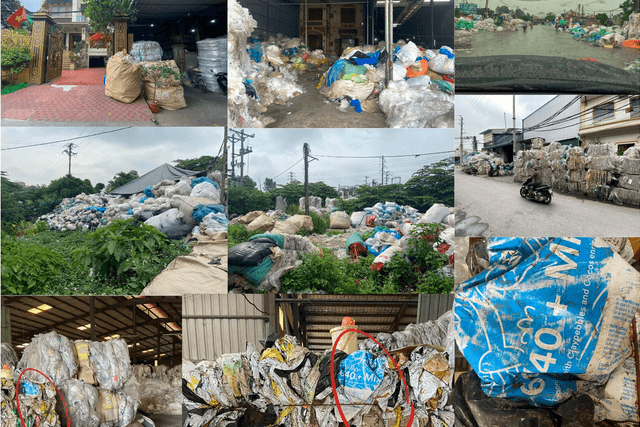
Britain’s exports of plastic waste to developing countries have surged by 84% in the first half of this year compared with the same period last year, according to an analysis of trade data.
Campaigners have condemned the rise – mainly involving shipments to Malaysia and Indonesia – as “unethical and irresponsible waste imperialism.”
In 2023, the European Union agreed to ban exports of waste to poorer nations outside the group of mostly high-income countries in the Organisation for Economic Co-operation and Development (OECD). The measure will come into force in November 2026 for an initial period of two and a half years, with the option to extend it. The UK, however, has no equivalent ban.
Data analysed by The Last Beach Cleanup, a US organisation campaigning to end plastic pollution, show that UK exports in the first half of 2025 rose sharply to Indonesia (24,006 tonnes, up from 525 tonnes in 2024) and Malaysia (28,667 tonnes, up from 18,872 tonnes in 2024).
Overall, UK plastic waste exports remained high in the first halves of both 2024 and 2025, at 319,407 tonnes and 317,647 tonnes respectively. The proportion sent directly to non-OECD countries increased from 11% in 2024 to 20% in 2025.
The findings were based on data from the UN Comtrade database. Jan Dell, of The Last Beach Cleanup, accused UK ministers of “hypocrisy” for failing to prohibit exports to developing nations.
“The UK is hypocritically saying, ‘we’re part of the high ambition coalition’, at the plastics talks. But behind the scenes, it is refusing to set a date to stop exporting to poorer countries,” she said. “We see it is increasing exports of its own plastic waste to places like Malaysia and Indonesia.”
She added: “It is unethical and irresponsible waste imperialism.”
Following the collapse of UN plastic treaty talks in August, Emma Hardy, under-secretary of state at the Department for Environment, Food and Rural Affairs (Defra), expressed her “huge disappointment” that a deal had not been reached but said she was proud of the UK’s efforts to pursue an ambitious treaty.
Britain was part of a “high ambition” coalition of nations advocating for legally binding commitments to cut plastic production and consumption, she added.
Environmental groups are urging the UK – one of the world’s top three countries exporting plastic waste, at around 600,000 tonnes a year – to follow the EU’s lead and ban exports to non-OECD countries. They are also calling for the closure of a loophole that makes it cheaper to ship waste overseas than to recycle it domestically.
Although the Conservative government announced plans in 2023 to introduce a ban on plastic waste exports to non-OECD countries; such a ban, it has yet to materialise.
Wong Pui Yi, a Malaysia-based consultant for the Basel Action Network – an organisation promoting environmental health and justice – said there were “good guys and bad guys” in the global waste trade.
“A lot of waste traders are looking to reduce costs,” she said. “If waste falls into the hands of the bad actors, one of the easiest ways to reduce costs is to avoid environmental controls. In developing countries, it is easier to avoid environmental controls due to weaker laws and lower enforcement capacity.”
In July, UK exports of plastic waste to Malaysia fell to 2.8% (1,500 tonnes), likely due to new import restrictions. However, as seen when China tightened its import rules in 2018, the trade often simply shifts to other destinations.
Experts warn that the actual volume of UK plastic waste ending up in Asia is likely higher than reported, as much of it is first exported to countries such as the Netherlands, where it can then be re-routed onwards. The UK also exports significant quantities to Turkey.
James McLeary, managing director of the UK recycling firm Biffa Polymers, said Britain should take responsibility for processing its own waste.
“It is just common sense as a human being” he said. “I don’t want my rubbish to end up in Malaysia. I don’t want to wonder if there is a boy whose life is wasted somewhere because of me throwing something in a bin outside my house.”
Earlier this month, the Boy Wasted investigation revealed that over the past decade, two workers on average have died every month in Turkey’s recycling sector, either crushed, torn, or burned to death.
Adnan Khan, the Canadian journalist whose reporting on refugee labour in Turkey sparked the inquiry, said that while Turkey operates a licensing system for plastic recycling, “my research shows it is fairly easy to obtain a licence and oversight is minimal. It’s a broken system.”
All EU plastic waste exports should be banned to anywhere outside the EU, he said. “I would go further and say every country should take care of its own trash.”
A Defra spokesperson said: “The export of waste is subject to strict controls set out in UK legislation.
“Our collection and packaging reforms will underpin £10bn worth of investment to support UK based recycling, reducing our dependency on exports of plastic waste.”
——————————————————————————
At Natural World Fund, we are passionate about restoring habitats in the UK to halt the decline in our wildlife.

